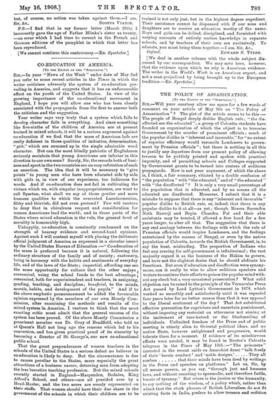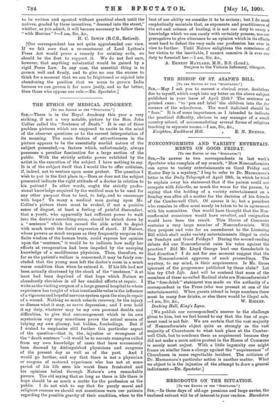THE POLICY OF ASSASSINATION.
LTO THE EDITOR OP THE "SPECTATOR:1
SIR,—Will your courtesy allow me space for a few words of comment on your article of May 9th on " The Policy of Assassination " ? The gist of the article seems to be this :- The people of Bengal deeply dislike English rule ; "the dis- affected are the educated " ; a group of Calcutta students have founded an organisation of which the object is to terrorise Government by the murder of prominent officials ; much of the popular dislike is "inherent and incurable," for "no extent of superior efficiency would reconcile Londoners to govern- ment by Prussian officials " ; but there is nothing in all this to justify any departure from our present policy of allowing treason to be publicly printed and spoken with practical impunity, and of permitting schools and Colleges supported by Government grants to be turned into centres of seditious propaganda. Now is not your argument, of which the above is, I think, a fair summary, vitiated by a double confusion of " the population " with "the educated," and of " the educated " with "the disaffected " ? It is only a very small percentage of the population that is educated, and by no means all the educated are disaffected. Moreover, I submit that it is a mistake to suppose that there is any "inherent and incurable" popular dislike to British rule, or, indeed, that there is any popular dislike to it at all—as yet ; though Messrs. Surendra Nath Banerji and Bepin Chandra Pal and their able assistants may be trusted, if allowed a free hand for a few years longer, to alter all that. The suggestion that there is any real analogy between the feelings with which the rule of Prussian officials would inspire Londoners, and the feelings entertained by the masses of Bengal, or even by the native population of Calcutta, towards the British Government, is, to say the least, misleading. The proportion of Indians who feel any craving for self-government is infinitesimal ; the vast majority regard it as the business of the Htikim to govern, and have not the slightest desire that he should abdicate his functions. But even if education and disaffection were synony- mous, can it really be wise to allow seditious speakers and writers to continue their efforts to poison the popular mind with- out any check but a very occasional prosecution ? W hat solid objection can be raised to the principle of the Vernacular Press Act passed by Lord Lytton's Government in 1878, which worked so smoothly and satisfactorily until it was repealed four years later for no better reason than that it was opposed to the liberal sentiment of the day ? That Act substituted effective prevention for capricious and uncertain punishment, without imposing any restraint on utterances not aiming at the incitement of race-hatred or the blackmailing of individuals. Unlimited freedom of the Press and of public meeting is utterly alien to Oriental political ideas, and no native State, however enlightened and progressive, would tolerate them for a moment. If evidence of its mischievous effects were needed, it may be found in Reuter's Calcutta telegram in the Times of May 11th :—" The prisoners" (arrested in the recent raids on Anarchist dens) "talk freely
of their ' heroic conduct' and ' noble designs.' They all confess that their minds have been fired by writings
in the Press and speeches on platforms." Let us, Sir, by all means • govern, as you say, "through just and humane laws, and without resorting to spasmodic, and therefore futile, bursts of tyranny." But where is the justice or the humanity, to say nothing of the wisdom, of a policy which, rather than admit that the stock phrases of British Liberalism do not fit existing facts in India, prefers to allow treason and sedition
to be written and spouted without practical check until the natives, goaded by these incentives, " descend into the street," whither, as you admit, it will become necessary to follow them " with Maxims" P-1 am, Sir, &c., H. C. IawiN (B.C.S., Retired).
[Our correspondent has not quite apprehended our view. If we felt sure that a re-enactment of Lord Lytton's Press Act would prove a remedy for existing evils, we should be the first to support it. We do not feel sure, however, that anything substantial would be gained by a rigid Press Law. In any case, the essential thing is to govern well and firmly, and to give no one the excuse to think for a moment that we can be frightened or cajoled into abandoning the position that we mean to govern India because we can govern it far more justly, and so far better, than those who oppose our rule.—ED. Spectator.]















































 Previous page
Previous page